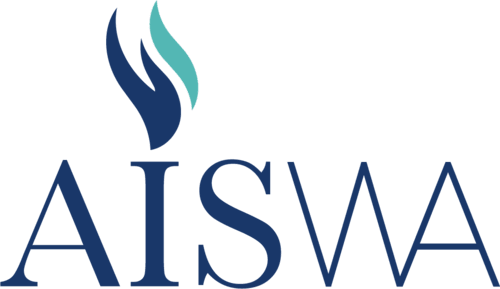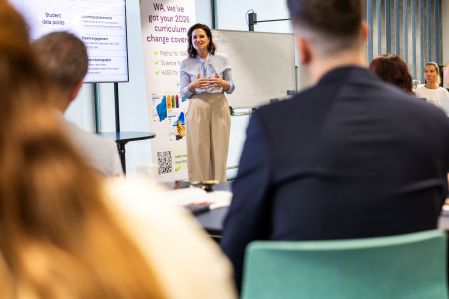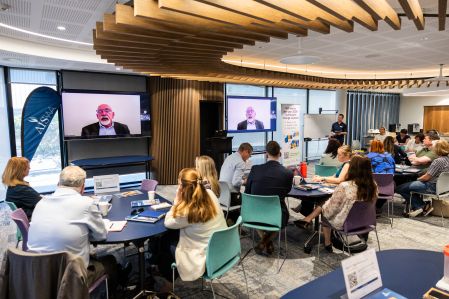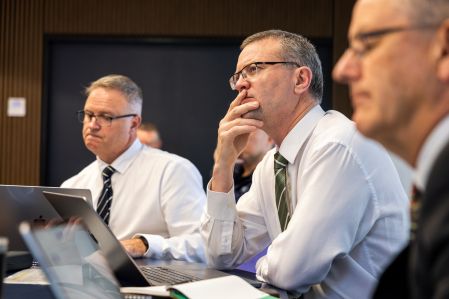AISWA Inspire: Stories of AI Adoption
Educators from across Western Australia gathered last week for AISWA Inspire: Stories of AI Adoption, a professional learning event showcasing how independent schools are leading the way in exploring the role of artificial intelligence in education. The day featured presentations from local schools, higher education partners, and international expert Professor Dylan Wiliam, offering a broad view of how AI is reshaping learning, teaching, and assessment.
Opening Address
The day began with a welcome from Liam, who acknowledged the independent sector’s leadership in adopting and experimenting with AI. He highlighted the rapid emergence of technologies such as ChatGPT and their ongoing influence on both education and public debate. Liam spoke about the opportunities AI offers to reduce administrative workload, enable deeper learning, and improve access to education, while also recognising the risks related to privacy, integrity, and misinformation. He noted that the regulation and control of AI will become a major topic in federal and state parliaments in the coming years, though the pace of technological change makes the future uncertain. Commending the agility and innovation of independent schools, he encouraged ongoing dialogue between schools and policymakers, inviting educators to share their stories and insights as AI policy continues to evolve. He then officially opened the conference, wishing attendees a productive and inspiring day.
Keynote – Dylan Wiliam
Professor Dylan Wiliam delivered the keynote address, exploring the purpose of education and the impact of AI on teaching and learning. He described four essential goals of education: empowering young people, transmitting culture, preparing citizens, and equipping learners for the changing world of work. These purposes, he explained, must remain balanced as AI reshapes society and the economy.
Dylan outlined how AI is transforming the world of work, automating tasks previously thought secure, yet also creating new opportunities through increased productivity. He argued that the future will favour adaptable generalists who can draw connections across disciplines. He cautioned against narrowing the curriculum to English, mathematics, and science, emphasising the importance of creative subjects and background knowledge for comprehension and employability. Since much of what students will need in the future is certain, schools must nurture curiosity and lifelong learning.
Dylan also focused on the importance of formative assessment, calling it the most effective and affordable way to improve achievement, motivation, and engagement. AI can assist by generating rubrics, success criteria, and examples, but teachers remain central in interpreting feedback and guiding learning. Dylan warned of “cognitive bypassing,” where students use AI to complete work without genuine engagement, and stressed that feedback should aim to improve the learner, not just the work. He concluded by noting that AI can also support teacher professional growth and that systems must reconsider the purpose of education in light of technological change.
School Showcases
Five independent schools presented case studies of AI adoption, illustrating diverse but complementary approaches across governance, leadership, and practice.
Carey Baptist College described a values-driven approach to ethical innovation, supported by resources such as The AI Good Practice Guide and Using AI Responsibly in English. Teachers have begun using AI tools for lesson planning, resource creation, and student support, with more than 85 percent of staff reporting some integration into their practice. The school has also developed a subject-specific GPT tutor for ATAR English that prompts students to think critically rather than complete work for them. Their experience highlighted that culture and trust are as important as policy when introducing new technologies.
Hale School shared how its long history of technological innovation informed its cautious but curious approach to AI. Professional learning programs have built staff capability and confidence, while new guidelines and a “traffic light” system have clarified expectations for students. The school is now developing in-house AI tools using Azure OpenAI services to provide personalised support based on internal data. Collaboration with St Hilda’s Anglican School for Girls has been central to their success, modelling the benefits of partnership and shared learning.
John XXIII College outlined a governance-first approach that began with a cross-school working group and draft AI framework aligned to national guidelines. By prioritising consultation, transparency, and professional learning, the college is embedding AI in ways that uphold integrity while supporting innovation. This deliberate pace has enabled teachers to experiment safely and focus on long-term sustainability.
Penrhos College emphasised curiosity, reflection, and collaboration. The school’s early exploration phase focused on understanding AI before writing policy, resulting in flexible guidelines integrated within existing IT frameworks. Teachers have trialled AI tools for administrative tasks such as report writing, while students have engaged with creative applications through Canva and Adobe. Their work reflects the belief that innovation grows from exploration rather than certainty.
St Hilda’s Anglican School for Girls showcased how AI can strengthen human connection through data-informed insight. The school has developed AI-enhanced dashboards that synthesise academic, pastoral, and demographic information to give teachers a fuller picture of each student. The tools are used to identify patterns, guide interventions, and support wellbeing. Through its partnership with Hale School, St Hilda’s also demonstrated how collaboration and shared governance can accelerate progress while maintaining ethical standards.
Presentation – Milanna and the Generative AI Project
Milanna presented the cross-sectoral Generative AI Project, developed through collaboration between the Department of Education WA, Catholic Education WA, AISWA, and SCSA. The project’s tool, WA ClassmAIte, enables teachers to generate curriculum-aligned lessons, worksheets, and slides, helping to reduce workload while maintaining quality. Teacher feedback has been overwhelmingly positive, praising the clarity, depth, and flexibility of the generated lessons. Milanna highlighted the importance of combining IT and education expertise early in the design process and maintaining flexibility as the technology evolves.
Presentation – Curtin University’s Assessment 2030
Professor Mollie Dollinger introduced Curtin University’s Assessment 2030 strategy, which aims to reimagine assessment for a digital and AI-influenced world. The “two-lane approach” distinguishes between assessments that assure learning and those that support learning. Lane 1 focuses on secure, summative assessments, while Lane 2 encourages formative and professionally relevant tasks that integrate AI appropriately. Mollie outlined guiding principles of validity, inclusivity, and sustainability and shared examples such as interactive orals, digital storytelling, and progressive thesis check-ins. The phased plan includes staff training, new resources, and the creation of a strong governance framework to support long-term change.
Closing Reflection
The AISWA Inspire event highlighted the independent sector’s leadership in responding to the opportunities and challenges of AI. Through strong values, collaboration, and a commitment to continuous learning, schools are demonstrating how technology can enhance teaching, streamline assessment, and strengthen the human relationships at the heart of education.



